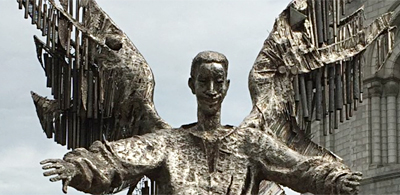We’re all from New Orleans now
I could write about the catastrophic loss the nation has suffered with the destruction of historic architecture in Louisiana and Mississippi, or of the damage done to museums and cultural institutions. But for me, the one story that so far sums up the appalling cultural losses suffered by the nation (and the world), comes from a cultural task force set up by the Federal Emergency Management Agency (FEMA). They reported seeing the Louis Armstrong House and Archives underwater… with photos, furniture and other parts of the collection floating out of the building.
Preservation Hall, built in 1750 and the historic home of New Orleans Jazz, is underwater and closed indefinitely. The cultural and artistic losses are innumerable and heartbreaking, but concerns over art are insignificant when compared to the enormous loss of life and the incredible suffering currently being shouldered by people in the affected areas.
Though I write from the safety and comfort of my Los Angeles studio, I cannot ignore the tragedy Hurricane Katrina has visited upon the good people of the gulf states. My television brings me nightmarish apocalyptic scenes of death and destruction that have brought tears to my eyes. New Orleans, one of America’s greatest cities, has almost been totally destroyed and its citizens stripped of all worldly goods. What will become of my fellow Americans, laid low by this natural disaster? Where will they find homes and work?
On Thursday, September 1st, the Mayor of New Orleans went on the radio to castigated the federal government for its lack of response to the crisis. Mayor Ray Nagin said Washington “didn’t have a clue” as to what was actually going on in his devastated city, most of which remains under water, and the mayor estimated the death toll is “most likely thousands.” Bodies are floating everywhere in the polluted waters, with as many as 100,000 people still trapped in the city.
Survivors, desperate for food and water, have resorted to taking what they need. Lawlessness prevails, with the once glorious city of New Orleans now looking like a set from George A. Romero’s Land of the Dead. Directly addressing the Feds, Nagin said: “Get off your asses and let’s do something – and let’s fix the biggest goddamn crisis in the history of this country. People are dying. They don’t have homes.”
The former secretary of the Louisiana Department of Environmental Quality, Martha Madden, also said on September 1st, “They can go into Iraq and do this and do that, but they can’t drop some food on Canal Street in New Orleans, Louisiana, right now? It’s just mind-boggling.” As I write this, five days into the crisis, the first major federal response is beginning to take shape. But for many it’s already too late.
My sadness and grief over the fate of Katrina’s victims is tempered by a seething anger, because much of this devastation and loss of life is actually the fault of Hurricane Bush. In 2001, FEMA warned the Bush administration of the likelihood that a major hurricane would strike New Orleans. The federal agency sited such a devastating hurricane as one of the three most likely disasters to hit the US. Bush’s response was to cut New Orleans flood control funding by 44 percent. By 2004 the Bush administration cut the Army Corps of Engineers’ funding to fix the levees of New Orleans’ Lake Pontchartrain by more than 80 percent.
By the beginning of 2005 the total slashing of funding reached a point that prevented the Corps from completing the work that could have saved New Orleans. The monies diverted from the flood control programs were instead used to fund the occupation of Iraq. The US Congress has approved funding of that war to the tune of $204.4 billion dollars. That breaks down to $5.6 billion per month – or $186 million a day. Congress is expected to authorize a further $45.3 billion for the war… and there’s no end in sight. In contrast, on September 2nd, 2005, Congress agreed to spend $10.5 billion dollars for disaster relief in areas of Louisiana, Mississippi, Alabama and Western Florida hit by Katrina.
And while we witness the appalling spectacle of tens of thousands of Americans crying for water, food, and medicine in the watery wastelands of New Orleans, let’s remember that Bush has sent some 78,000 National Guard troops overseas, primarily to Iraq. Around 40 percent of Mississippi’s Guard units are deployed in Iraq, along with 35 percent of the units from Louisiana – for a combined total of about 6,000 troops. The trucks, bulldozers, cranes, high water vehicles, generators and other types of heavy equipment used by these National Guard units in disaster relief have also been shipped to Iraq.
In addition, one must ponder the highly touted Homeland Security administration and its effectiveness in actually protecting Americans. If they couldn’t handle a natural disaster that they could plainly see coming – how then will they respond to a situation that takes them by surprise? The callousness and incompetence of the Bush regime knows no bounds. It has left America’s people naked and vulnerable. We’re all from New Orleans now.



